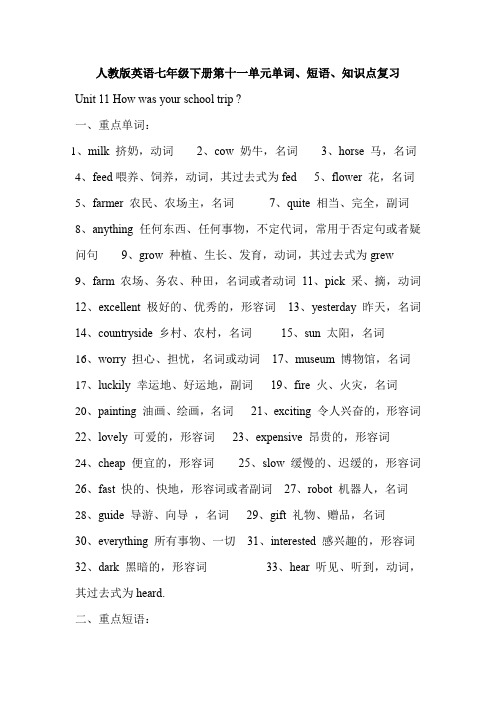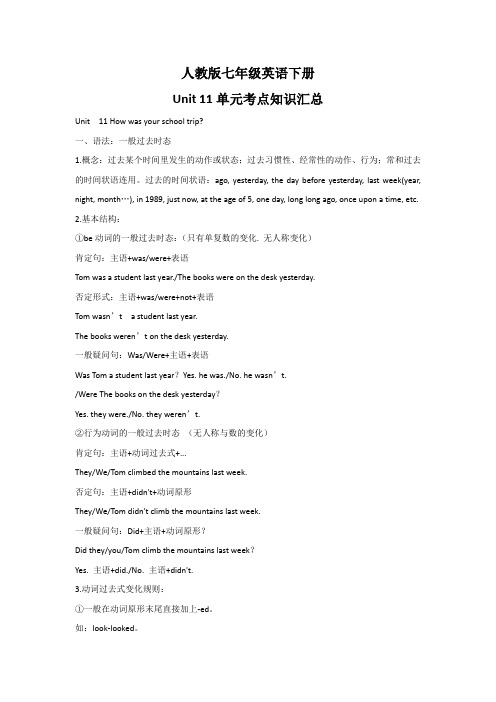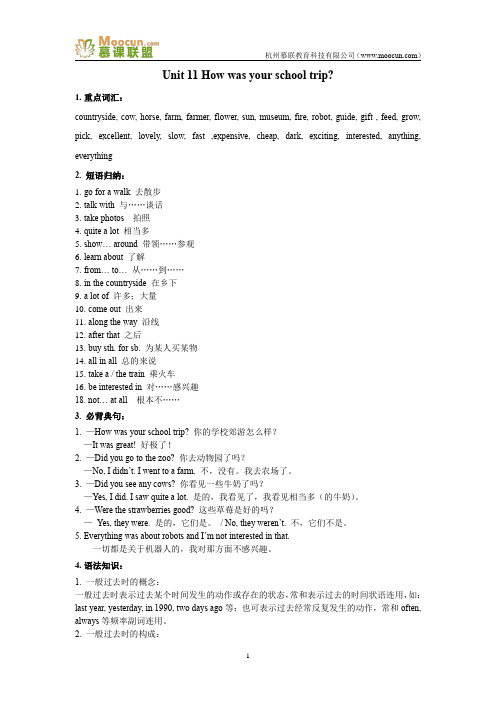人教版英语七年级下册第十一单元
人教版英语七年级下册第十一单元单词、短语、知识点清单

人教版英语七年级下册第十一单元单词、短语、知识点复习Unit 11 How was your school trip ?一、重点单词:1、milk 挤奶,动词2、cow 奶牛,名词3、horse 马,名词4、feed喂养、饲养,动词,其过去式为fed5、flower 花,名词5、farmer 农民、农场主,名词7、quite 相当、完全,副词8、anything 任何东西、任何事物,不定代词,常用于否定句或者疑问句9、grow 种植、生长、发育,动词,其过去式为grew9、farm 农场、务农、种田,名词或者动词11、pick 采、摘,动词12、excellent 极好的、优秀的,形容词13、yesterday 昨天,名词14、countryside 乡村、农村,名词15、sun 太阳,名词16、worry 担心、担忧,名词或动词17、museum 博物馆,名词17、luckily 幸运地、好运地,副词19、fire 火、火灾,名词20、painting 油画、绘画,名词21、exciting 令人兴奋的,形容词22、lovely 可爱的,形容词23、expensive 昂贵的,形容词24、cheap 便宜的,形容词25、slow 缓慢的、迟缓的,形容词26、fast 快的、快地,形容词或者副词27、robot 机器人,名词28、guide 导游、向导,名词29、gift 礼物、赠品,名词30、everything 所有事物、一切31、interested 感兴趣的,形容词32、dark 黑暗的,形容词33、hear 听见、听到,动词,其过去式为heard.二、重点短语:1、milk a cow 给奶牛挤奶2、ride a horse 骑马2、feed chicken喂鸡4、quite a lot (of) 许多。
6、in the countryside 在乡下、在农村6、fire station 消防站7、all in all 总的来说8、be interested in ... 对。
人教版七年级英语下册Unit 11单元考点知识汇总

人教版七年级英语下册Unit 11单元考点知识汇总Unit 11 How was your school trip?一、语法:一般过去时态1.概念:过去某个时间里发生的动作或状态;过去习惯性、经常性的动作、行为;常和过去的时间状语连用。
过去的时间状语:ago, yesterday, the day before yesterday, last week(year, night, month…), in 1989, just now, at the age of 5, one day, long long ago, once upon a time, etc.2.基本结构:①be动词的一般过去时态:(只有单复数的变化. 无人称变化)肯定句:主语+was/were+表语Tom was a student last year./The books were on the desk yesterday.否定形式:主语+was/were+not+表语Tom wasn’t a student last year.The books weren’t on the desk yesterday.一般疑问句:Was/Were+主语+表语Was Tom a student last year?Yes. he was./No. he wasn’t./Were The books on the desk yesterday?Yes. they were./No. they weren’t.②行为动词的一般过去时态(无人称与数的变化)肯定句:主语+动词过去式+...They/We/Tom climbed the mountains last week.否定句:主语+didn't+动词原形They/We/Tom didn't climb the mountains last week.一般疑问句:Did+主语+动词原形?Did they/you/Tom climb the mountains last week?Yes. 主语+did./No. 主语+didn't.3.动词过去式变化规则:①一般在动词原形末尾直接加上-ed。
pep人教版七年级下册英语第十一单元知识点

pep人教版七年级下册英语第十一单元知识点人教版七年级下册英语第十一单元主要包括以下几个知识点。
1. 主谓一致在句子中,主语和谓语动词在人称和数上要保持一致。
主语是第三人称单数时,谓语动词要加上-s或-es。
例如:She walks to school every day.(她每天走路去上学。
)2. it 作形式主语当句子主语是不定式、动名词、形容词或从句时,我们可以用it作为形式主语,而将真正的主语放到句子后面。
例如:It is important to learn English well.(学好英语是重要的。
)3. 疑问句形式一般疑问句的形式是将谓语动词移到主语前面。
如果带有疑问词,疑问词放在句子的前面。
例如:Do you often go to the park?(你经常去公园吗?)Where do you live?(你住在哪里?)4. 可数名词和不可数名词可数名词有单数和复数之分,而不可数名词只有单数形式。
例如:I have a pen.(我有一支钢笔。
)I have some milk.(我有一些牛奶。
)5. 副词的比较级和最高级一般情况下,加-er表示比较级,加-est表示最高级。
如果词以元音字母+y结尾,要改成-i再加-er或-est。
部分词以辅音字母+y结尾,直接加-er或-est。
有些比较级和最高级形式需要变化。
例如:fast→faster→fastest(快的→更快的→最快的)这些是人教版七年级下册英语第十一单元的主要知识点,掌握了这些知识点,学生们就能够更好地理解和运用相关的语法规则和词汇,提高自己的英语水平。
人教版七年级下册英语第十一单元主要包括以下几个知识点的详细解释和相关练习。
1. 主谓一致在句子中,主语和谓语动词在人称和数上要保持一致。
主语是第三人称单数时,谓语动词要加上-s或-es。
例如:He goes to school every day.(他每天上学。
)她们每天在学校玩。
七年级下册人教版英语第十一单元Rope-play

七年级下册人教版英语第十一单元Rope-playguitar [ɡɪ'tɑ:(r)] n. 吉他sing [sɪŋ] v. 唱;唱歌swim [swɪm] v. & n. 游泳dance [dɑːns], [dæns] v. 跳舞 n. 舞蹈draw [drɔː] v. 画chess [tʃes] n. 国际象棋play chess 下国际象棋speak [spiːk] v. 说(某种语言);说话speak English 说英语join [dʒɔɪn] v. 参加;加入club [klʌb] n. 俱乐部;社团be good at… 擅长于……tell [ tel ] v. 讲述;告诉story ['stɔːrɪ] n. 故事;小说write [raɪt] v. 写作;写字show [ʃəʊ] n. 演出;节目 v. 给……看;展示;or [ɔː(r)] conj. 或者;也不(用于否定句)talk [tɔːk] v. & n. 说话;交谈talk to … 跟……说kungfu [,kʌŋ’fuː] n.(中国)功夫drum [drʌm] n. 鼓play the drums 敲鼓piano [pɪ'ænəʊ] n. 钢琴play the piano 弹钢琴violin [,vaɪə'lɪn] n. 小提琴play the violin 拉小提琴also ['ɔːlsəʊ] adv. 也;而且people ['piːpl] n. 人;人们home [həʊm] n. 家;活动本部 adv. 到家;在家be good with… 善于应付……的;对……有办法make [meɪk] v. 使成为;制造make friends 结交朋友today [tə'deɪ] adv. 在今天help (sb) with sth 在某方面帮助(某人)center ['sentə(r)] n.(=centre)中心;中央weekend [,wiːk'end], [ 'wiː kend] n. 周末on the weekend (在)周末。
人教版英语七年级下册单元Unit 11 知识点+测试卷+思维导图

Unit 11 How was your school trip?1.重点词汇:countryside, cow, horse, farm, farmer, flower, sun, museum, fire, robot, guide, gift , feed, grow, pick, excellent, lovely, slow, fast ,expensive, cheap, dark, exciting, interested, anything, everything2. 短语归纳:1.go for a walk 去散步2.talk with 与……谈话3.take photos 拍照4.quite a lot 相当多5.show… around 带领……参观6.learn about 了解7.from… to… 从……到……8.in the countryside 在乡下9.a lot of 许多;大量e out 出来11.along the way 沿线12.after that 之后13.buy sth. for sb. 为某人买某物14.all in all 总的来说15.take a / the train 乘火车16.be interested in 对……感兴趣18. not… at all 根本不……3. 必背典句:1. —How was your school trip? 你的学校郊游怎么样?—It was great! 好极了!2. —Did you go to the zoo? 你去动物园了吗?—No, I didn’t. I went to a farm. 不,没有。
我去农场了。
3. —Did you see any cows? 你看见一些牛奶了吗?—Yes, I did. I saw quite a lot. 是的,我看见了,我看见相当多(的牛奶)。
4. —Were the strawberries good? 这些草莓是好的吗?—Yes, they were. 是的,它们是。
人教版七年级下册 Unit 11知识点总结

七年级下册Unit 11知识点总结第一部分:重点单词1. milk 不可数名词,“牛奶”动词,“挤奶”milk a cow 给奶牛挤奶2. farm 名词,“农场”动词,“务农;种田”farmer 农民3. quite 副词,“相当;完全”修饰形容词副词,quite a lot 相当多拼写注意与quiet(安静的)的区分4. grow “种植”grow strawberries 种草莓动词“生长;发育”grow up 长大“增加;增长”The number of students wearing glasses grows.戴眼镜的学生数量增加了。
5. pick 动词“采摘”pick apples 摘苹果“选择;挑选”pick up “捡起;接电话;接某人“6. worry 动词&名词,“担心;担忧“worry about … 担心… worry sb. 使某人担心7. luckily 副词,“幸运地“unluckily 不幸地lucky 幸运的(形容词)luck 幸运;运气(名词)8. exciting 形容词,“使人兴奋的;令人激动的“excited 感到激动的、兴奋的an exciting message 一个令人激动的消息He is excited to see his old friend.见到老朋友他很激动。
9. expensive 形容词,“昂贵的“cheap ”便宜的“10. slow 形容词,“缓慢的;迟缓的“slowly 缓慢地(副词)fast快地(的)动词,“减慢“slow down 减速慢行11. guide 名词,“导游,向导“动词,“指导“guide sb. to do … 指导某人做某事12. interested 形容词,“感兴趣的“be interested in … 对…感兴趣interesting 有趣的This is an interesting book. 这是一本有趣的书。
人教版七年级英语下册:第十一单元短语语法归纳练习含答案
人教版七年级英语下册第十一单元短语语法归纳练习第一部分【重点短语】给奶牛挤奶骑马go for a walkquite a lot/quite a lot of+n. learn a lot about sth.pick strawberriestake sth. homeworry+that 从句worried about ....last weekIt was so much fun.an art museumgo on a tripmake a model robotsb. sth.all in all(for sb.) to do sth.not at all 去钓鱼喂鸡show sb. aroundgrow strawberries pick upin the countryside worry about .... /become outhave so much fun. the science museumalong the waybuy sth. for sb. = buyit's difficultbe interested in(doing) sth.【答案】从左至右:milk a cow; go fishing; ride a horse; feed chickens;去散步=t2卜《a walk;带领某人参观;相当多的;关于… 学到很多;种草莓;摘草莓;捡起/接某人;带…回家;在农村;担心……;担心某人某事;上周;出来/出版/开花;如此有趣;玩得非常开心;一个艺术博物馆;科学博物馆;去旅行;沿途;制作一个机器人模型;为某人买某物;总之;对某人来说做某事很困难;根本不/一点也不;对(做)…感兴趣第二部分【重点语法】一、一般过去时1.定义一般过去时表示过去某个时间或一段时间内发生的动作或状态;也可表示过去经常或反复发生的动作。
e.g.I got up at 7:00 yesterday.我昨天7 点起床。
Unit11讲义人教版英语七年级下册
Unit11 How was your school trip?1.fed chickensfed 为feed的过去式译为:饲养、喂养用法:feed...on... 用...喂养...feed...to...把...喂给...feed on ...(动物)以...为主食Eg:I sometimes feed the carrot to the rabbit.She feeds the dog on meat.The horse feeds on grass.2.I saw quite a lot.a lot:许多,大量(此处作宾语)还可作表语Eg:There is a lot to do.辨析:a lot,a lot of, lots ofa lot of:许多;大量=lots of (后接可数名词复数/不可数名词) 辨析:quite &veryquite:(adv)十分,非常(修饰adj/adv)very:(adv)很,非常语气较quite重(修饰adj/adv)注意:quite &very与不定冠词连用时的位置不同:a+very+adj+n quite+a(n)+adj+nEg:a very handsome boy quite a handsome boya very interesting story quite an interesting storyEg:She sings quite well. He is quite a kind boy.This kind of fruit is very healthy. Thank you very much.3.Did you learn anything?辨析:anything&somethinganything:(不定代词)任何事物;某事物(常用于否定句/疑问句中) something:(不定代词)某事(常用于肯定句中) 但是在表示请求、建议、或征求意见的疑问句中常用something注意:(1)adj修饰不定代词,要位于其后(2)不定代词作主语时,谓语动词用单数形式(3)补充其他不定代词some any no every/body thing oneEg:There isn’t anything wrong.There is something wrong with my puter.4.The farmer showed Carol around the farm.farmer:(n)农民farm:(n)农场;(v)干农活farming:(不可数n)农事Eg:The farmers are working on the farm,and there is too much farming.show sb.around...带某人到处参观...Eg:The guide shows us around the museum.与show相关的短语:show sb.sth=show sth.to sb.给...看展示on show 展览show off 炫耀show up出现5.The farmers don’t grow apples.grow:(vt)种植;栽培(vi)生长;发育Eg:Farmers in the south of China mainly grow rice.Everything begins to grow in spring.短语:grow up成长,长大grow into成长为;发展成(由一种情况变成另外一种情况)Eg:I want to be a guide when I grow up.She grows into a lovely girl.辨析:grow&plantgrow: 种植(强调过程/状态)plant:(v)种植(仅表示栽入土中,表示动作)(n)植物Eg:The farmers grow a lot of trees every year.The farmers plant lots of trees every year.There are many different plants in the garden.6....we worried it would rain.worry:(vt)担心;担忧后常接宾语从句Eg:His parents worry that their child will sick.(vt)使担心;使发愁(常接sb.作宾语)Eg:The naughty boy worries his parents.worry about sb./sth.=be worried about sb./sth. 担心某人/某事Eg:Don’t worry about me ./Don’t be worried about me.7.Luckily,it didn’t,and the sun came out again.(1)luckily(adv)幸运地常用于句首,用逗号隔开unluckily不幸地unfortunately fortunate(adj)幸运的fortunately(adv)幸运地以辅音字母+y结尾的形容词变成副词的方法:改y为i再加ly Eg:happy lucky busy angry easy(2)sun moon earth star 都是世界上独一无二的事物,前面必须加the(3)e out出来;发芽;开花;出版与e相关的短语:e from来自 e on加油;快点 e back 回来e down 下来 e in 进来 e up with 提出;想出;赶上e across遇到8.expensive/cheapexpensive/cheap只能形容事物的贵贱;当谈论价格(price)时,只能用high/lowEg:The pen is cheap.=The price of the pen is low.9.All in all,it was an exciting day.all in all:总的来说;总之in a word:简言之in short:总之Eg:All in all, it’s good for you to do more exercise.辨析:all in all, in all,at allall in all:总的来说(常用于句首)eg:All in all, we had a good time. in all:总共;合计(句首/句末)eg:There are fifty students in all.at all:根本常用于“not at all”根本不Eg:He doesn’t like apples at all.与all相关的短语:all the time 一直after all 毕竟10.I didn’t like the trip at all.Not at all 用于回答感谢/道歉Eg:Thank you very much.Not at all.其它的回答:It’s my pleasure. It’s a pleasure. No problem.You’re wele. That’s all right. That’s OK.一般过去时态含义:表示过去某个时间发生的动作或存在的状态,也表示过去经常或反复发生的动作。
Unit11单元知识点归纳总结及配套练习-人教版英语七年级下册
Unit11 How was your school trip?Ⅰ. Revision(复习)Ⅱ. Presentation(重点,难点,考点,热点呈现)一般过去式1. 含义:表示动作或者状态发生在过去2.构成:肯定句:主语+动词过去式+ 其它如:I went home at nine o'clock yesterday.否定句:主语+didn't +动词原形+其它如:I didn't go home yesterday. He didn't tell me about you.疑问句:一般疑问句:Did +主语+动词原形+宾语如:Did you go home yesterday?Did you study in the school?肯定回答:Yes, I did. 否定回答:No, I didn't.特殊疑问句:特殊疑问词+did +主语+动词原型+宾语When did you finish your homework last night? What did you do the day before yesterday?3. 一般过去时态动词变化形式一般过去时态由动词的过去式表示。
大多数动词的过去式是在动词原形后加上ed构成。
这类动词称为规则动词。
1)一般情况下在词尾直接加ed。
如:play―played work―worked2)以e结尾的动词只加d. 如:like--- liked love―loved3)以辅音字母+Y结尾的动词,变Y为i,再加ed. 如:study―studied carry―carried 4)以重读闭音节结尾的动词,如果末尾只有一个辅音字母,要双写最后这个辅音字母,再加ed.如:stop―stopped5)不以ed 结尾的过去式,称为不规则动词,如:write --wrote go-went do-did have-had see-saw take-took make-made come-came buy-bought4. 标志词。
人教版七年级下册英语11单元知识点总结
七年级下册英语unit11单元总结重点短语1.Go for a week 去散步k a cow? 给奶牛挤奶3.Ride a horse. 骑马4.Feed chickens. 喂鸡5.Talk with. 与……谈话6.Take photos. 拍照7.Quite a lot of. 许多8.Show Sb around. 带领某人参观9.Learn about. 了解10.From…two.... 从…..到11.Grow strawberries. 种植草莓12.Pick strawberries. 摘草莓13.In the countryside. 在乡下,在农村14.Go fishing. 去钓鱼15.At night 在夜晚e out 出来17.Go on a school trip 参加学校旅行18.Along the way 沿途.19.After that 之后.20.All in all. 总的说来。
21.Take a\the train. 乘火车22.Be interested in 对…感兴趣?.23.Not…at…all. 根本不…24.So much fun. 如此多的乐趣。
25.Fire station. 消防站26.Make a model robot. 制作机器人模型。
重点句型1.What did sb do? 某人做什么了?——What did carl do? 卡罗尔做什么了?——She picked some strawberries.她摘了一些草莓。
2.How was\were...? .....怎么样?——How was your school trip? 你的学校旅行怎么样?——It was great. 太棒了!3.Did. Sb. Do sth. 某人做某事了吗?——Did you go to the zoo? 你去动物园了吗?——No, I didn't. I went to a farm. 不,我没有,不我去农场了。
- 1、下载文档前请自行甄别文档内容的完整性,平台不提供额外的编辑、内容补充、找答案等附加服务。
- 2、"仅部分预览"的文档,不可在线预览部分如存在完整性等问题,可反馈申请退款(可完整预览的文档不适用该条件!)。
- 3、如文档侵犯您的权益,请联系客服反馈,我们会尽快为您处理(人工客服工作时间:9:00-18:30)。
4. 结对活动(Pairwork)
Show on the screen 12 different activity pictures. Get the students to have a pairwork like this.
5. 猜谜(Guessing game)
❶Present the sentence “I had a good time last weekend. ” on the screen. Note that last weekend is a past time period. Change the sentence into the General Interrogative Question “Did you have a good time last weekend?” Help the students to answer “Yes, I did./ No, I didn’t.”
❷Have guessing game. Get the students to guess “What did Mr Fang do last weekend?”by asking “Did y ou …(加词组原形) last weekend? ”(went to a park) Guess in the same way what Mr Fang saw in the park.
6. 听力训练(Activity 1b)
Get the students to have a listening practice. Get the students to listen to Listening Cassette Activity 1b. Listen and circle the three things Carol did on her school trip in 1a. Check the answers with the class.
7. 1c活动(Activity 1c)
Get the students to read through the dialog in Activity 1c. Try to read and recite the dialogue. Then work in pairs and make up similar dialog talking about farm activities after the model.
8. 语法总结(Grammar Summary)
Present some verbs and their past forms(some unlearned). Get the students to summarize the rules for the regular past forms. Present some verbs and correspondent regular past form. Work in groups and finish the exercise on the screen.
9. 作业(Homework)
1.Copy the new words on Page 51 four times.
2.Recite and copy the verbs and their past forms.
3.Make up a new dialogue talking about past events after the
model dialog in 1a. Try to make the dialogue a little longer.
五、教学策略选择与信息技术融合的设计
教师活动预设学生活动设计意图利用多媒体视频进行导入学生观察视频中出现的英语词汇
吸引学生注意力,激发学习兴
趣
分组进行讨论动词过去式的构成形式各抒己见,由代表进行发言充分利用小组讨论,展开学生思维,培养主动学习、发现学
习的能力
六、教学评价设计
本节课的设计思路是以任务型语言教学作为核心通过设计视频导入、分组讨论等活动让学生用所学语言去练习,在练习的过程中发现和运用自己所学语言。
最后的作业的设计既促进了学生的创新能力的提高和培养了他们的动手能力,使课堂的
知识得到了延伸也使每位学生都得到了体验成功的喜悦心情。
